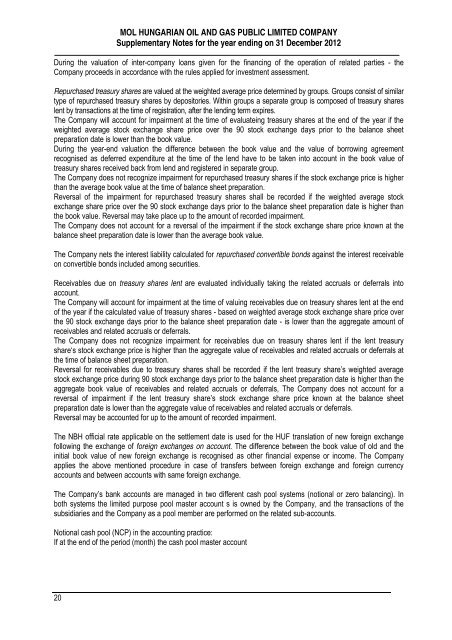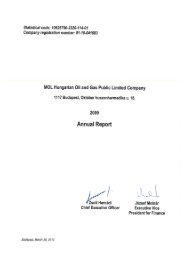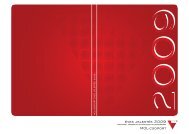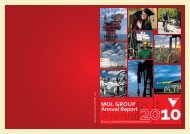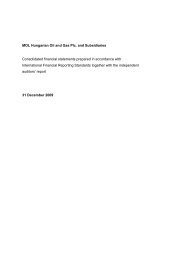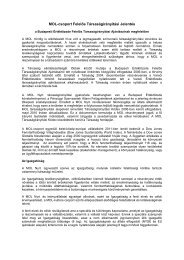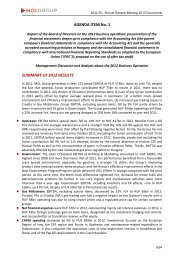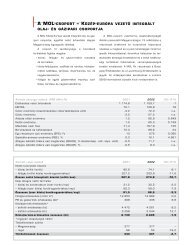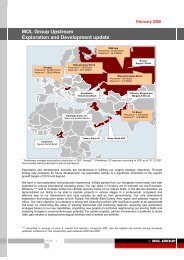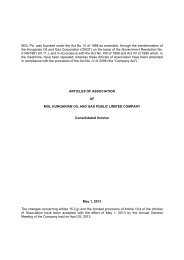MOL Hungarian Oil and Gas Public Limited Company Annual report ...
MOL Hungarian Oil and Gas Public Limited Company Annual report ...
MOL Hungarian Oil and Gas Public Limited Company Annual report ...
Create successful ePaper yourself
Turn your PDF publications into a flip-book with our unique Google optimized e-Paper software.
<strong>MOL</strong> HUNGARIAN OIL AND GAS PUBLIC LIMITED COMPANYSupplementary Notes for the year ending on 31 December 2012During the valuation of inter-company loans given for the financing of the operation of related parties - the<strong>Company</strong> proceeds in accordance with the rules applied for investment assessment.Repurchased treasury shares are valued at the weighted average price determined by groups. Groups consist of similartype of repurchased treasury shares by depositories. Within groups a separate group is composed of treasury shareslent by transactions at the time of registration, after the lending term expires.The <strong>Company</strong> will account for impairment at the time of evaluateing treasury shares at the end of the year if theweighted average stock exchange share price over the 90 stock exchange days prior to the balance sheetpreparation date is lower than the book value.During the year-end valuation the difference between the book value <strong>and</strong> the value of borrowing agreementrecognised as deferred expenditure at the time of the lend have to be taken into account in the book value oftreasury shares received back from lend <strong>and</strong> registered in separate group.The <strong>Company</strong> does not recognize impairment for repurchased treasury shares if the stock exchange price is higherthan the average book value at the time of balance sheet preparation.Reversal of the impairment for repurchased treasury shares shall be recorded if the weighted average stockexchange share price over the 90 stock exchange days prior to the balance sheet preparation date is higher thanthe book value. Reversal may take place up to the amount of recorded impairment.The <strong>Company</strong> does not account for a reversal of the impairment if the stock exchange share price known at thebalance sheet preparation date is lower than the average book value.The <strong>Company</strong> nets the interest liability calculated for repurchased convertible bonds against the interest receivableon convertible bonds included among securities.Receivables due on treasury shares lent are evaluated individually taking the related accruals or deferrals intoaccount.The <strong>Company</strong> will account for impairment at the time of valuing receivables due on treasury shares lent at the endof the year if the calculated value of treasury shares - based on weighted average stock exchange share price overthe 90 stock exchange days prior to the balance sheet preparation date - is lower than the aggregate amount ofreceivables <strong>and</strong> related accruals or deferrals.The <strong>Company</strong> does not recognize impairment for receivables due on treasury shares lent if the lent treasuryshare‘s stock exchange price is higher than the aggregate value of receivables <strong>and</strong> related accruals or deferrals atthe time of balance sheet preparation.Reversal for receivables due to treasury shares shall be recorded if the lent treasury share’s weighted averagestock exchange price during 90 stock exchange days prior to the balance sheet preparation date is higher than theaggregate book value of receivables <strong>and</strong> related accruals or deferrals, The <strong>Company</strong> does not account for areversal of impairment if the lent treasury share’s stock exchange share price known at the balance sheetpreparation date is lower than the aggregate value of receivables <strong>and</strong> related accruals or deferrals.Reversal may be accounted for up to the amount of recorded impairment.The NBH official rate applicable on the settlement date is used for the HUF translation of new foreign exchangefollowing the exchange of foreign exchanges on account. The difference between the book value of old <strong>and</strong> theinitial book value of new foreign exchange is recognised as other financial expense or income. The <strong>Company</strong>applies the above mentioned procedure in case of transfers between foreign exchange <strong>and</strong> foreign currencyaccounts <strong>and</strong> between accounts with same foreign exchange.The <strong>Company</strong>’s bank accounts are managed in two different cash pool systems (notional or zero balancing). Inboth systems the limited purpose pool master account s is owned by the <strong>Company</strong>, <strong>and</strong> the transactions of thesubsidiaries <strong>and</strong> the <strong>Company</strong> as a pool member are performed on the related sub-accounts.Notional cash pool (NCP) in the accounting practice:If at the end of the period (month) the cash pool master account20


